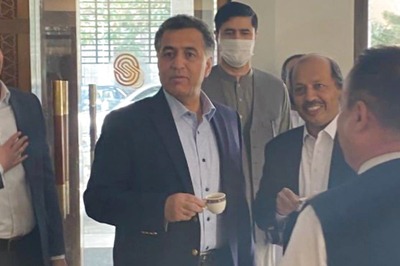
views
Washington: IMF chief Kristalina Georgieva on Friday urged policymakers to avoid premature withdrawal of support for the economy as coronavirus continues to spread in many parts of the world. Noting that the COVID-19 pandemic and the measures to contain it triggered a sharp downturn in the first half of this year, she said the economic activity has begun to recover, supported by a large-scale easing of fiscal and monetary policies in many advanced and emerging economies.
The widespread adoption of health measures, allowing restart with economic activities while the pandemic is still there, Georgieva, the International Monetary Fund (IMF) Managing Director, said. Avoid premature withdrawal of support for the economy, as this could inflict tremendous damage," she said.
"In terms of fiscal space and capacity to provide support, advanced economies have so far deployed 20 per cent of GDP, emerging market economies six per cent, and low-income countries 2 per cent, Georgieva said in her address to the Development Committee Plenary Meeting of the International Monetary Fund and the World Bank here. The International Monetary Fund Managing Director Kristalina Georgieva To help developing countries maintain support, the IMF and the World Bank will have to lean forward, she said.
Georgieva also urged policymakers to gradually redirect public support to underpin structural change and the post-pandemic economy that should be more equitable and focused on knowledge, digital and green sectors. Job-rich investments can support this, like infrastructure rehabilitation in advanced economies, or new infrastructure in emerging markets and developing countries. This will help ensure a just transition, together with training and skills. In other words, we need to build forward to the economy of tomorrow, she said.
Deal with pre-existing conditions. Those countries that enter the crisis with strong fundamentalslike fiscal buffers, effective institutions, transparent governance and high quality of spendingare doing better. Those with pre-existing difficulties have been more severely affected, the IMF chief said. Georgieva said that it would be essential to guarantee access to essential health supplies. "Borders need to remain open for trade. Vaccines and treatments need to be available to all when they are discovered," she said.
She welcomed the World Bank's announcement of USD 12 billion to help developing countries to finance the purchase and distribution of vaccines, tests, and treatments for their citizens. Manufacturing drives the recovery, while contract dependent services are lagging. But we are not out of the woods. The virus continues to spread in many parts of the world. As a result, several countries have slowed reopening, and some are even reinstating partial lockdowns, she said.
The IMF expects global activity to contract by 4.4 per cent in 2020the sharpest decline since the Great Depression. A recovery of 5.2 per cent is expected in 2021but even with this, the world economy would remain well below its pre-crisis growth path, she said. Inflation is expected to remain subdued, as weak demand outweighs the impact of supply chain disruptions on prices. There is an exceptional degree of uncertainty around this outlook. "It relates to the spread and infectiousness of the virus, the public health response, the extent of global spillovers, financial market sentiment, and the persistence of supply chain disruptions. All this means that we have to be prepared for setbacks, she said.
We are experiencing a tale of two cities. Parts of the economy and those employed in it are doing well especially the digital economy and tech sectorwhile others face the grim reality of protracted, and even permanent decline, Georgieva said.
.
Read all the Latest News and Breaking News here



















Comments
0 comment